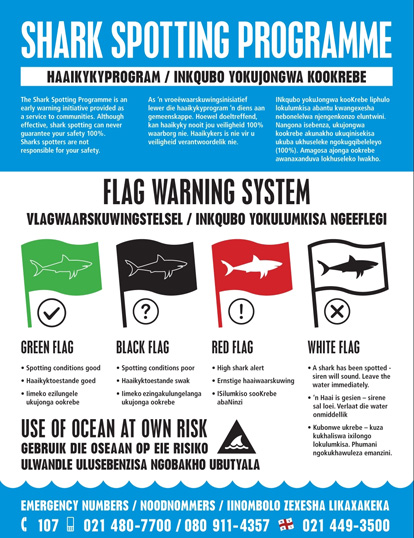High white shark activity in False Bay
The City of Cape Town and the Shark Spotting Programme would like to make water users aware of the current high white shark activity in the inshore area of False Bay, particularly in the Muizenberg, Fish Hoek and Clovelly area. Yesterday, the 29 November, Shark Spotters recorded 5 sightings at Fish Hoek and 6 at Muizenberg, and this morning there has already been 2 sightings at Fish Hoek. For recent sightings at a Shark Spotter beach please visit www.sharkspotters.org.za. The spotters are also recording more than one shark at any given time at both beaches and the sharks are very active and seem to be feeding. Yellowtail (Seriola lalandi) have been seen schooling in the area and it is likely that the white sharks are following and targeting the yellowtail, one of their known preferred prey species. The City and Shark Spotters are appealing to all water users to be extra vigilant at this time, to familiarize themselves with the recent shark activity in the area before entering the water, obey the shark siren, and to take note of the Shark Spotters` flags and signage for regular updates on shark sightings. People are reminded that this behaviour is normal shark behaviour for the summer period.
Beach users urged to remain alert with continued high shark activity – 30 November 2010:
The City of Cape Town would like to appeal to all beach users to exercise caution, following continued high shark activity in the Cape peninsula. The warning of high shark activity in False Bay which was issued yesterday still remains in place. In addition, the City would like to alert beach users to possible Great White Shark sightings along the Atlantic Seaboard coast.
The City’s Coastal Management section is monitoring the situation and will continue to issue warnings to the public where necessary. Thanks to the generous assistance of Paul Baines, the City has been able to partner with the Shark Spotters Programme and the Save Our Seas Shark Centre to conduct weekly aerial surveys of the Atlantic and False Bay coastlines. These surveys record all shark and other marine life activity.
The high levels of shark activity are not unusual for this time of year, when there is an abundance of fish for the sharks to follow. The risk of a shark attack remains very low if beach users adhere to the City’s recommended safety tips. All beach users should familiarise themselves with the recent shark activity in the area before entering the water, obey the shark siren, and take note of the Shark Spotters’ flags and signage for regular updates on shark sightings.
Shark safety tips
• Do not swim, surf or surf-ski when birds, dolphins or seals are feeding nearby
• Do not swim in deep water beyond the breakers
• Do not swim if you are bleeding
• Do not swim near river mouths
• Do not swim, surf or surf-ski near where trek-netting, fishing or spear fishing is taking place
• Do not swim, surf or surf-ski at night
• If a shark has recently been sighted in an area where no shark spotters are present, consider using another beach for the day
• First time visitors to beach areas should ask the local law enforcement official, life guards or locals about the area
• Obey beach officials if asked to leave the water
• For those people kayaking or surf-skiing far out to the sea, paddle in groups and stay close together (in a diamond shape)
• Consider using a personal shark shield when surfing or kayaking
• Pay attention to any shark signage on beaches
The City will continue to provide updated information as it becomes available and beach users are encouraged to visit www.sharkspotters.org.za and staging.saveourseas.com for further information.
MEDIA ENQUIRIES:
SAKHILE TSOTSOBE
COASTAL COORDINATOR
CITY OF CAPE TOWN
TEL: 021 400 4638 CELL: 072 626 3669
ALISON KOCK
SHARK SPOTTING PROGRAMME
SAVE OUR SEAS SHARK CENTRE
CELL: 072 661 9516

